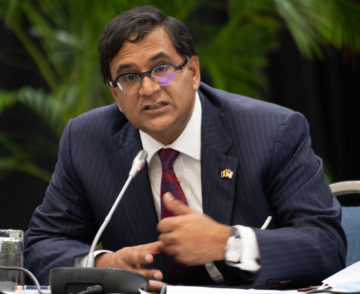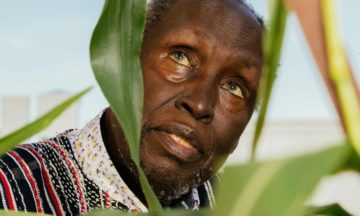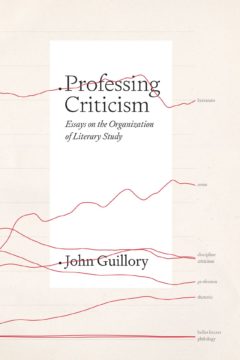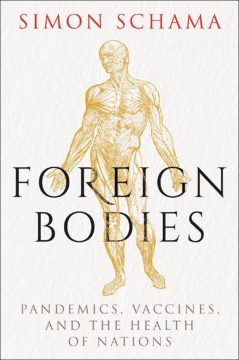 Lee Harris in Foreign Policy:
Lee Harris in Foreign Policy:
Avinash Persaud is impatient with his audience. “I was born into the moral imperative of development,” he tells diplomats gathered in March at the G-20 Sherpas Meeting in India. “My growing up was a realization that moral imperative is not enough.”
Development officials have descended on the lush coastal state of Kerala to discuss “woman-led development,” “bridging the digital divide,” and other subjects on which moral grandstanding is endemic.
Persaud seems short-tempered. He rushes through a flat personal introduction and moves on to the proposal he was invited to discuss: a plan to lower the cost of borrowing for green investment in poor countries. India, this year’s G-20 president, has asked this statesman from a tiny Caribbean island to give the keynote address.
Since 2020, Persaud, who is climate envoy to Barbados Prime Minister Mia Mottley, has vaulted to prominence in the small and sharp-elbowed world of development finance, advising big industrializing economies such as Brazil and Pakistan. His warm reception in India is partly due to the lectures he won’t deliver. He is trying fix a lopsided global financial system, not nagging anyone to shut off coal.
A London banker of Caribbean Indian descent, Persaud has been friends with Mottley since their days as students at the London School of Economics. He led currencies research at State Street and J.P. Morgan, where he developed trading strategies based on the observation that currency fluctuations are often more tied to investor risk appetite and U.S. interest rates than the soundness of developing economies.
 Ngũgĩ is a giant of African writing, and to a Kenyan writer like me he looms especially large. Alongside writers such as Chinua Achebe and Wole Soyinka, he was part of a literary scene that flourished in the 1950s and 60s, during the last years of colonialism on the continent. If Achebe was the prime mover who captured the deep feeling of displacement that colonisation had wreaked, and Soyinka the witty, guileful intellectual who tried to make sense of the collision between African tradition and western ideas of freedom, then Ngũgĩ was the unabashed militant. His writing was direct and cutting, his books a weapon – first against the colonial state, and later against the failures and corruption of Kenya’s post-independence ruling elite.
Ngũgĩ is a giant of African writing, and to a Kenyan writer like me he looms especially large. Alongside writers such as Chinua Achebe and Wole Soyinka, he was part of a literary scene that flourished in the 1950s and 60s, during the last years of colonialism on the continent. If Achebe was the prime mover who captured the deep feeling of displacement that colonisation had wreaked, and Soyinka the witty, guileful intellectual who tried to make sense of the collision between African tradition and western ideas of freedom, then Ngũgĩ was the unabashed militant. His writing was direct and cutting, his books a weapon – first against the colonial state, and later against the failures and corruption of Kenya’s post-independence ruling elite.
 Starting during Barack Obama’s first run for president, I began making a number of predictions that struck most people as outlandish at the time. First was the prediction, based in part on Obama’s rise,
Starting during Barack Obama’s first run for president, I began making a number of predictions that struck most people as outlandish at the time. First was the prediction, based in part on Obama’s rise,  As Americans, we find ourselves in a culture that so fetishizes success that it cannot tolerate failure. So it deals with it in one of two ways. The first is to view failure in individualized and atomized terms, blaming the losers for their losses. The second, which is equally insidious, is to be so disdainful of failure that it insists that what looks like failure in fact is a mere “stepping-stone to success,” in the philosopher Costica Bradatan’s phrase. Thus the platitudinous self-help bromides that we find adorned on a framed poster in a bank teller’s cubicle (“Failure is success in progress”) or shouted by a fitness influencer hawking protein powder on TikTok (“There’s no failure that willpower can’t turn into success”). In a culture that demands overcoming against all odds, even failure has been commodified by the American self-help industrial complex: rebranded not as a devastating and possibly life-altering event but as a blip en route to a chest-thumping achievement, accomplishment, or acquisition.
As Americans, we find ourselves in a culture that so fetishizes success that it cannot tolerate failure. So it deals with it in one of two ways. The first is to view failure in individualized and atomized terms, blaming the losers for their losses. The second, which is equally insidious, is to be so disdainful of failure that it insists that what looks like failure in fact is a mere “stepping-stone to success,” in the philosopher Costica Bradatan’s phrase. Thus the platitudinous self-help bromides that we find adorned on a framed poster in a bank teller’s cubicle (“Failure is success in progress”) or shouted by a fitness influencer hawking protein powder on TikTok (“There’s no failure that willpower can’t turn into success”). In a culture that demands overcoming against all odds, even failure has been commodified by the American self-help industrial complex: rebranded not as a devastating and possibly life-altering event but as a blip en route to a chest-thumping achievement, accomplishment, or acquisition. It’s a warm summer afternoon and you have everything set-up for a lovely afternoon in the great outdoors. You’ve got a cold drink in hand and the smell of sausages sizzling away is making you hungry. You fold out the camp chair and dust of the cobwebs, ready to chill out. Just then, the all too familiar buzz of a fly echoes in your ear. And so the onslaught begins. You swat and they just come back, gluttons for the punishment of your lazily swiping hand. Sure, they’re a nuisance. But flies get a bad rap and we’re here to try and convince you that they could in fact be seen as the true heroes of the Aussie summer.
It’s a warm summer afternoon and you have everything set-up for a lovely afternoon in the great outdoors. You’ve got a cold drink in hand and the smell of sausages sizzling away is making you hungry. You fold out the camp chair and dust of the cobwebs, ready to chill out. Just then, the all too familiar buzz of a fly echoes in your ear. And so the onslaught begins. You swat and they just come back, gluttons for the punishment of your lazily swiping hand. Sure, they’re a nuisance. But flies get a bad rap and we’re here to try and convince you that they could in fact be seen as the true heroes of the Aussie summer. The Republican political consultant Richard Berman is something of a legend, often credited with taking the art of negative campaigning on behalf of undisclosed corporate clients to the next level. When “60 Minutes” did a profile of him, in 2007, he was portrayed as the “Dr. Evil” of the Washington influence game. More than a decade later, when I visited his office in downtown D.C., he still had a tongue-in-cheek “Dr. Evil” nameplate on his desk. (“If they call you Mr. Nice Guy, would that be better?”
The Republican political consultant Richard Berman is something of a legend, often credited with taking the art of negative campaigning on behalf of undisclosed corporate clients to the next level. When “60 Minutes” did a profile of him, in 2007, he was portrayed as the “Dr. Evil” of the Washington influence game. More than a decade later, when I visited his office in downtown D.C., he still had a tongue-in-cheek “Dr. Evil” nameplate on his desk. (“If they call you Mr. Nice Guy, would that be better?”  Jeffrey Herlihy-Mera in the LA Review of Books:
Jeffrey Herlihy-Mera in the LA Review of Books: Lee Harris in Foreign Policy:
Lee Harris in Foreign Policy: I
I While reading “What an Owl Knows,” by the science writer Jennifer Ackerman, I was reminded that my daughter once received a gift of a winter jacket festooned with colorful owls. At the time I thought of the coat as merely cute, but it turns out that the very existence of such merchandise reflects certain cultural assumptions about the birds: namely, that they are salutary and good.
While reading “What an Owl Knows,” by the science writer Jennifer Ackerman, I was reminded that my daughter once received a gift of a winter jacket festooned with colorful owls. At the time I thought of the coat as merely cute, but it turns out that the very existence of such merchandise reflects certain cultural assumptions about the birds: namely, that they are salutary and good. Studying “Hamlet,” the revenge play about a rotten kingdom, I tried for years to fathom Hamlet’s motives, state of mind, family web, obsessions.
Studying “Hamlet,” the revenge play about a rotten kingdom, I tried for years to fathom Hamlet’s motives, state of mind, family web, obsessions. I can tell you where it all started because I remember the moment exactly. It was late and I’d just finished the novel I’d been reading. A few more pages would send me off to sleep, so I went in search of a short story. They aren’t hard to come by around here; my office is made up of piles of books, mostly advance-reader copies that have been sent to me in hopes I’ll write a quote for the jacket. They arrive daily in padded mailers—novels, memoirs, essays, histories—things I never requested and in most cases will never get to. On this summer night in 2017, I picked up a collection called Uncommon Type, by Tom Hanks. It had been languishing in a pile by the dresser for a while, and I’d left it there because of an unarticulated belief that actors should stick to acting. Now for no particular reason I changed my mind. Why shouldn’t Tom Hanks write short stories? Why shouldn’t I read one? Off we went to bed, the book and I, and in doing so put the chain of events into motion. The story has started without my realizing it. The first door opened and I walked through.
I can tell you where it all started because I remember the moment exactly. It was late and I’d just finished the novel I’d been reading. A few more pages would send me off to sleep, so I went in search of a short story. They aren’t hard to come by around here; my office is made up of piles of books, mostly advance-reader copies that have been sent to me in hopes I’ll write a quote for the jacket. They arrive daily in padded mailers—novels, memoirs, essays, histories—things I never requested and in most cases will never get to. On this summer night in 2017, I picked up a collection called Uncommon Type, by Tom Hanks. It had been languishing in a pile by the dresser for a while, and I’d left it there because of an unarticulated belief that actors should stick to acting. Now for no particular reason I changed my mind. Why shouldn’t Tom Hanks write short stories? Why shouldn’t I read one? Off we went to bed, the book and I, and in doing so put the chain of events into motion. The story has started without my realizing it. The first door opened and I walked through. I was left wondering after a moment of peak Simon Schama – where we are led from his ‘idle’ purchase in Paris of a slim old book on Marcel Proust’s father, Adrien, to his own bookshelves by the Hudson River – whether great historians must have something close to a Proustian affinity for a particular period of history, one they understand not simply as a result of study but which they inhabit emotionally, with a quality not far separated from a kind of memory. The reason why the dim fog of mid-medieval western Europe was cleared by Richard Southern is because he understood that world at an elemental level and could translate that understanding to the reader. The same is true when it comes to Steven Runciman writing on Crusade-torn Byzantium, Eamon Duffy on England on the eve of the Reformation and David Brading on early colonial Latin America.
I was left wondering after a moment of peak Simon Schama – where we are led from his ‘idle’ purchase in Paris of a slim old book on Marcel Proust’s father, Adrien, to his own bookshelves by the Hudson River – whether great historians must have something close to a Proustian affinity for a particular period of history, one they understand not simply as a result of study but which they inhabit emotionally, with a quality not far separated from a kind of memory. The reason why the dim fog of mid-medieval western Europe was cleared by Richard Southern is because he understood that world at an elemental level and could translate that understanding to the reader. The same is true when it comes to Steven Runciman writing on Crusade-torn Byzantium, Eamon Duffy on England on the eve of the Reformation and David Brading on early colonial Latin America.